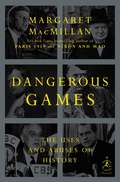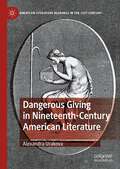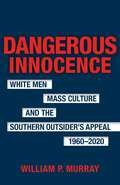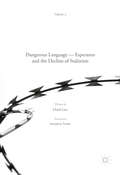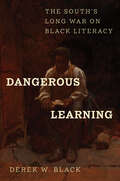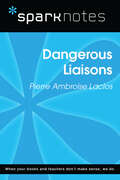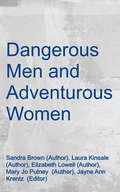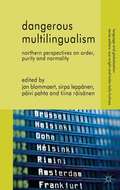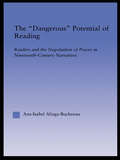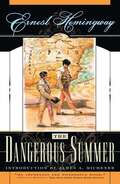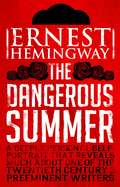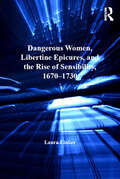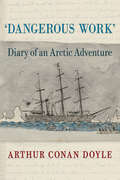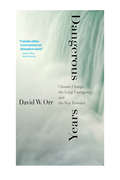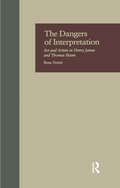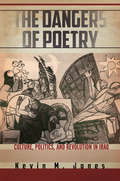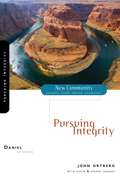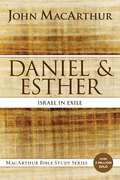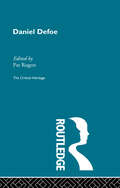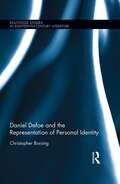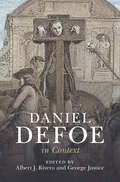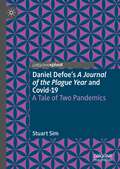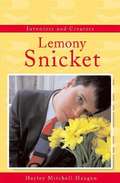- Table View
- List View
Dangerous Games: The Uses and Abuses of History (Modern Library Chronicles #31)
by Margaret MacmillanAn acclaimed historian and "New York Times"-bestselling author explores the many ways in which history affects everyone. Full of insights gleaned from studies of numerous historical events, "Dangerous Game" serves as a plea to treat history with care.
Dangerous Giving in Nineteenth-Century American Literature (American Literature Readings in the 21st Century)
by Alexandra UrakovaThis book explores the dark, unruly, and self-destructive side of gift-giving as represented in nineteenth-century literary works by American authors. It asserts the centrality and relevance of gift exchange for modern American literary and intellectual history and reveals the ambiguity of the gift in various social and cultural contexts, including those of race, sex, gender, religion, consumption, and literature. Focusing on authors as diverse as Emerson, Kirkland, Child, Sedgwick, Hawthorne, Poe, Douglass, Stowe, Holmes, Henry James, Twain, Howells, Wilkins Freeman, and O. Henry as well as lesser-known, obscure, and anonymous authors, Dangerous Giving explores ambivalent relations between dangerous gifts, modern ideology of disinterested giving, and sentimental tradition.
Dangerous Innocence: White Men, Mass Culture, and the Southern Outsider's Appeal, 1960–2020 (Southern Literary Studies)
by William P. MurrayDangerous Innocence investigates how prevailing constructions of white masculinity in the U.S. South help feed and reinforce systems of racial inequity. Tracing the rise of the “southern outsider” in literature and on television from 1960 to 2020, William P. Murray probes white Americans’ enduring desire to assert their own blamelessness even though such acts of self-justification facilitate continued violence against historically oppressed populations. Dangerous Innocence courses from popular television such as The Andy Griffith Show and The Waltons through influential fiction by Eudora Welty, Walker Percy, and other prominent southern authors—alongside forceful challenges voiced by Black writers including Chester Himes and Ernest Gaines—before turning to works created after the September 11 attacks that reinscribe cultural logics predicated on protecting white innocence and power. Concluding on a note of praxis, Dangerous Innocence argues that reattaching southern outsiders to a communal identity encourages an honest assessment about what whiteness represents and what it means to belong to a nation steeped in commitments to white supremacy.
Dangerous Intimacies: Toward a Sapphic History of the British Novel
by Lisa L. MooreRefuting commonly held beliefs within women's and lesbian history, feminist theory, and histories of the novel, Dangerous Intimacies challenges the idea that sex between women was unimaginable in British culture before the late nineteenth century. Lisa L. Moore argues that literary representations of female sexual agency--and in particular "sapphic" relationships between women--were central to eighteenth-century debates over English national identity. Moore shows how the novel's representation of women's "romantic friendships"--both platonic and sexual--were encoded within wider social concerns regarding race, nation, and colonialist ventures.Moore demonstrates that intimacy between women was vividly imagined in the British eighteenth century as not only chaste and virtuous, but also insistently and inevitably sexual. She looks at instances of sapphism in such novels as Millenium Hall, Memoirs of a Woman of Pleasure, Belinda, and Emma and analyzes how the new literary form of the novel made the bourgeois heroine's successful negotiation of female friendship central to the establishment of her virtue. Moore also examines representations of sapphism through the sweeping economic and political changes of the period and claims that middle-class readers' identifications with the heroine's virtue helped the novel's bourgeois audience justify the violent bases of their new prosperity, including slavery, colonialism, and bloody national rivalry.In revealing the struggle over sapphism at the heart of these novels of female friendship--and at the heart of England's national identity--Moore shows how feminine sexual agency emerged as an important cultural force in post-Enlightenment England
Dangerous Language — Esperanto and the Decline of Stalinism
by Ulrich LinsThis book examines the rise of the international language Esperanto, launched in 1887 as a proposed a solution to national conflicts and a path to a more tolerant world. The chapters in this volume examine the position of Esperanto in Eastern Europe during the Cold War; in particular it explores Stalin's final years and the gradual re-emergence of the Esperanto movement. At first, its revival was limited to the satellite countries, especially Bulgaria and Poland, but, with Stalinism's gradual retreat, Esperanto organizations reappeared in most East European countries and eventually in the Soviet Union itself. The progress was uneven, and its details reveal the stresses and strains that became apparent as the solidarity of the Soviet bloc declined. This book will appeal to a wide readership, including linguists, historians, political scientists and others interested in the history of the twentieth century from the unusual perspective of language. This volume is complemented by the sister volume Dangerous Language -- Esperanto under Hitler and Stalin which offers a concentration on the creation and early emergence of Esperanto as an international language.
Dangerous Learning: The South's Long War on Black Literacy
by Derek W BlackThe enduring legacy of the nineteenth-century struggle for Black literacy in the American South Few have ever valued literacy as much as the enslaved Black people of the American South. For them, it was more than a means to a better life; it was a gateway to freedom and, in some instances, a tool for inspiring revolt. And few governments tried harder to suppress literacy than did those in the South. Everyone understood that knowledge was power: power to keep a person enslaved in mind and body, power to resist oppression. In the decades before the Civil War, Southern governments drove Black literacy underground, but it was too precious to be entirely stamped out. This book describes the violent lengths to which southern leaders went to repress Black literacy and the extraordinary courage it took Black people to resist. Derek W. Black shows how, from the beginning of the nineteenth century to the end of Reconstruction, literacy evolved from a subversive gateway to freedom to a public program to extend citizenship and build democratic institutions—and how, once Reconstruction was abandoned, opposition to educating Black children depressed education throughout the South for Black and white students alike. He also reveals the deep imprint those events had on education and how this legacy is resurfacing today.
Dangerous Liaisons (SparkNotes Literature Guide Series)
by SparkNotesDangerous Liaisons (SparkNotes Literature Guide) by Pierre Choderlos de Laclos Making the reading experience fun! Created by Harvard students for students everywhere, SparkNotes is a new breed of study guide: smarter, better, faster.Geared to what today's students need to know, SparkNotes provides:chapter-by-chapter analysis explanations of key themes, motifs, and symbols a review quiz and essay topics Lively and accessible, these guides are perfect for late-night studying and writing papers.
Dangerous Men And Adventurous Women: Romance Writers On The Appeal Of The Romance (New Cultural Studies)
by Jayne Ann KrentzIn Dangerous Men and Adventurous Women, Jayne Ann Krentz and the contributors to this volume -- all best-selling romance novelists -- explode the myths and biases that haunt both the writers and readers of romances.
Dangerous Multilingualism
by Jan Blommaert Sirpa Leppänen Päivi Pahta Tiina RäisänenFocuses on the endangering effects of language-ideological processes. This book looks at the challenges imposed by globalization and super-diversity on the nation state and its language situations and ideologies, and demonstrates how many of its problems rise from the tension between late-modern diversity and the (pre-)modernist responses to it.
The Dangerous Potential of Reading: Readers & the Negotiation of Power in Selected Nineteenth-Century Narratives (Literary Criticism and Cultural Theory)
by Ana-Isabel Aliaga-BuchenauFirst Published in 2004. Routledge is an imprint of Taylor & Francis, an informa company.
The Dangerous Summer
by Ernest HemingwayThe Dangerous Summer is Hemingway's firsthand chronicle of a brutal season of bullfights. In this vivid account, Hemingway captures the exhausting pace and pressure of the season, the camaraderie and pride of the matadors, and the mortal drama as in fight after fight the rival matadors try to outdo each other with ever more daring performances. At the same time Hemingway offers an often complex and deeply personal self-portrait that reveals much about one of the twentieth century's preeminent writers.
Dangerous Summer
by Ernest HemingwayThe Dangerous Summer is Hemingway's firsthand chronicle of a brutal season of bullfights. In this vivid account, Hemingway captures the exhausting pace and pressure of the season, the camaraderie and pride of the matadors, and the mortal drama--as in fight after fight--the rival matadors try to outdo each other with ever more daring performances. At the same time Hemingway offers an often complex and deeply personal self-portrait that reveals much about one of the twentieth century's preeminent writers.
Dangerous Women, Libertine Epicures, and the Rise of Sensibility, 1670-1730 (British Literature In Context In The Long Eighteenth Century Ser.)
by Laura LinkerIn the first full-length study of the figure of the female libertine in late seventeenth- and early eighteenth-century literature, Laura Linker examines heroines appearing in literature by John Dryden, Aphra Behn, Catharine Trotter, Delariviere Manley, and Daniel Defoe. Linker argues that this figure, partially inspired by Epicurean ideas found in Lucretius's De rerum natura, interrogates gender roles and assumptions and emerges as a source of considerable tension during the late Stuart and early Georgian periods. Witty and rebellious, the female libertine becomes a frequent satiric target because of her transgressive sexuality. As a result of negative portrayals of lady libertines, women writers begin to associate their libertine heroines with the pathos figures they read in French texts of sensibilité. Beginning with a discussion of Charles II's mistresses, Linker shows that these women continue to serve as models for the female libertine in literature long after their "reigns" at court ended. Her study places the female libertine within her cultural, philosophical, and literary contexts and suggests new ways of considering women's participation and the early novel, which prominently features female libertines as heroines of sensibility.
Dangerous Work: Diary of an Arctic Adventure
by Sir Arthur Conan DoyleIn 1880 a young medical student named Arthur Conan Doyle embarked upon the "first real outstanding adventure" of his life, taking a berth as ship's surgeon on an Arctic whaler, the Hope. The voyage took him to unknown regions, showered him with dramatic and unexpected experiences, and plunged him into dangerous work on the ice floes of the Arctic seas. He tested himself, overcame the hardships, and, as he wrote later, "came of age at 80 degrees north latitude. " Conan Doyle's time in the Arctic provided powerful fuel for his growing ambitions as a writer. With a ghost story set in the Arctic wastes that he wrote shortly after his return, he established himself as a promising young writer. A subsequent magazine article laying out possible routes to the North Pole won him the respect of Arctic explorers. And he would call upon his shipboard experiences many times in the adventures of Sherlock Holmes, who was introduced in 1887's A Study in Scarlet. Out of sight for more than a century was a diary that Conan Doyle kept while aboard the whaler. Dangerous Work: Diary of an Arctic Adventure makes this account available for the first time. With humor and grace, Conan Doyle provides a vivid account of a long-vanished way of life at sea. His careful detailing of the experience of arctic whaling is equal parts fascinating and alarming, revealing the dark workings of the later days of the British whaling industry. In addition to the transcript of the diary, the e-book contains two nonfiction pieces by Doyle about his experiences; and two of his tales inspired by the journey. To the end of his life, Conan Doyle would look back on this experience with awe: "You stand on the very brink of the unknown," he declared, "and every duck that you shoot bears pebbles in its gizzard which come from a land which the maps know not. It was a strange and fascinating chapter of my life. " Only now can the legion of Conan Doyle fans read and enjoy that chapter.
Dangerous Years
by David W. OrrA leading environmental thinker takes a hard look at the obstacles and possibilities on the long road to sustainability  This gripping, deeply thoughtful book considers future of civilization in the light of what we know about climate change and related threats. David Orr, an award-winning, internationally recognized leader in the field of sustainability and environmental education, pulls no punches: even with the Paris Agreement of 2015, Earth systems will not reach a new equilibrium for centuries. Earth is becoming a different planet--more threadbare and less biologically diverse, with more acidic oceans and a hotter, more capricious climate. Furthermore, technology will not solve complex problems of sustainability.  Yet we are not fated to destroy the Earth, Orr insists. He imagines sustainability as a quest and a transition built upon robust and durable democratic and economic institutions, as well as changes in heart and mindset. The transition, he writes, is beginning from the bottom up in communities and neighborhoods. He lays out specific principles and priorities to guide us toward enduring harmony between human and natural systems.Â
The Dangers of Interpretation: Art and Artists in Henry James and Thomas Mann (Origins of Modernism #8)
by Ilona TreitelFirst published in 1996. This comparative study investigates thematic and technical similarities in the works of the two authors who shared a cultural heritage and achieved comparable status in their separate literary traditions. Drawing upon theories by Bloom, Bakhtin, and Lacan, the book examines ways in which Henry James and Thomas Mann treat the creative artist and analyze the creative and interpretive processes in their fiction. The texts covered range from early works to their great modern novels: The Golden Bowland Doctor Faustus To a great extent, the similarities between the works stem from the authors' preoccupation with artistic responsibility. Adopting Bloom's claim that the creative activity is an interpretive one, and that the reader, as well as the writer, interprets a text into being the book also investigates the reader's responsibility in confronting the dilemmas challenging James' and Mann's artist figures. Such challenges are "the dangers of interpretation" discussed in this book. Index. Bibliography.
The Dangers of Poetry: Culture, Politics, and Revolution in Iraq
by Kevin M. JonesPoetry has long dominated the cultural landscape of modern Iraq, simultaneously representing the literary pinnacle of high culture and giving voice to the popular discourses of mass culture. As the favored genre of culture expression for religious clerics, nationalist politicians, leftist dissidents, and avant-garde intellectuals, poetry critically shaped the social, political, and cultural debates that consumed the Iraqi public sphere in the twentieth century. The popularity of poetry in modern Iraq, however, made it a dangerous practice that carried serious political consequences and grave risks to dissident poets. The Dangers of Poetry is the first book to narrate the social history of poetry in the modern Middle East. Moving beyond the analysis of poems as literary and intellectual texts, Kevin M. Jones shows how poems functioned as social acts that critically shaped the cultural politics of revolutionary Iraq. He narrates the history of three generations of Iraqi poets who navigated the fraught relationship between culture and politics in pursuit of their own ambitions and agendas. Through this historical analysis of thousands of poems published in newspapers, recited in popular demonstrations, and disseminated in secret whispers, this book reveals the overlooked contribution of these poets to the spirit of rebellion in modern Iraq.
Daniel: Pursuing Integrity (New Community Bible Study Series)
by John Ortberg Kevin & HarneyStand Strong in Life&’s Furnaces How do you respond when the bottom drops out? What happens to your character quotient when things don&’t go the way you planned? How do you react when the temperature is rising, you are under attack, and God seems far away? Daniel discovered that the furnace experiences of life refine and define us. Spiritual integrity rarely grows when everything goes our way. Instead, God uses things like a furnace, a lion&’s den, a mad king, and exile in a foreign country to forge character in a soul. If you long to meet God in the challenging times and come through the fire stronger and more faithful, Daniel is ready to show the way.
Daniel and Esther: Israel in Exile (MacArthur Bible Studies)
by John F. MacArthurMany of God's people through the ages have been called to endure times of hardship, loneliness, and suffering. Some, such as Daniel and Esther, were even members of a race carried away to a foreign land that had never heard of the God of Israel. Their lives were not easy, but even in the midst of trials, these men and women discovered that God was with them—and that He was actively leading the events in their lives.In this study, pastor John MacArthur will guide you through an in-depth look at the historical period of Israel's exile, beginning with the prophet Daniel being carried off to Babylon, continuing through the rise of the Persian Empire, and concluding with Esther's reign as queen.Studies include close-up examinations of Daniel, Nebuchadnezzar, Esther, Haman, and others, as well as careful considerations of doctrinal themes such as "Standing Boldly for God" and "God's Sovereignty Over the Future."—ABOUT THE SERIES—The MacArthur Bible Study series is designed to help you study the Word of God with guidance from widely respected pastor and author John MacArthur. Each guide provides intriguing examinations of the whole of Scripture by examining its parts and incorporates:Extensive, but straight-forward commentary on the text.Detailed observations on overriding themes, timelines, history, and context.Word and phrase studies to help you unlock the broader meaning and apply it to your life.Probing, interactive questions with plenty of space to write down your response and thoughts.
Daniel Defoe: The Critical Heritage (Critical Heritage Ser.)
by Pat RogersFirst published in 1995. Routledge is an imprint of Taylor & Francis, an informa company.
Daniel Defoe and the Representation of Personal Identity (Routledge Studies in Eighteenth-Century Literature)
by Christopher BorsingThe concept of a personal identity was a contentious issue in the early eighteenth century. John Locke’s philosophical discussion of personal identity in An Essay Concerning Human Understanding fostered a public debate upon the status of an immortal Christian soul. This book argues that Defoe, like many of this age, had religious difficulties with Locke’s empiricist analysis of human identity. In particular, it examines how Defoe explores competitive individualism as a social threat while also demonstrating the literary and psychological fiction of any concept of a separated, lone identity. This foreshadows Michel Foucault’s assertion that the idea of man is ‘a recent invention, a figure not yet two centuries old, a new wrinkle in our knowledge’. The monograph’s engagement with Defoe’s destabilization of any definition or image of personal identity across a wide range of genres – including satire, political propaganda, history, conduct literature, travel narrative, spiritual autobiography, piracy and history, economic and scientific literature, rogue biography, scandalous and secret history, dystopian documentary, science fiction and apparition narrative - is an important and original contribution to the literary and cultural understanding of the early eighteenth century as it interrogates and challenges modern presumptions of individual identity.
Daniel Defoe, Contrarian
by Robert James MerrettA highly conscious wordsmith, Daniel Defoe used expository styles in his fiction and non-fiction that reflected his ability to perceive material and intellectual phenomena from opposing, but not contradictory perspectives. Moreover, the boundaries of genre within his wide-ranging oeuvre can prove highly fluid. In this study, Robert James Merrett approaches Defoe's body of work using interdisciplinary methods that recognize dialectic in his verbal creativity and cognitive awareness.Examining more than ninety of Defoe's works, Merrett contends that this author's literariness exploits a conscious dialogue that fosters the reciprocity of traditional and progressive authorial procedures. Along the way, he discusses Defoe's lexical and semantic sensibility, his rhetorical and aesthetic theories, his contrarian theology, and more. Merrett proposes that Defoe's contrarian outlook celebrates a view of consciousness that acknowledges the brain's bipartite structure, and in so doing illustrates how cognitive science may be applied to further explorations of narrative art.
Daniel Defoe in Context (Literature in Context)
by Albert J. Rivero George JusticeInnovative in its structure and approach, Daniel Defoe in Context contains 42 essays by leading scholars illuminating the life, times, and world of Daniel Defoe. Defoe is one of the most important literary figures in English history, thanks not only to his pioneering novels Robinson Crusoe and Moll Flanders, but also to his notable works in journalism, travel writing, conduct literature, and verse, both satiric and serious. Written with general readers and students in mind, the essays in this volume provide up-to-date knowledge about eighteenth-century literature, culture, and history in a high quality, clearly written, but completely accessible form. Together they demonstrate the ways not only in which Defoe's world shaped his writing, but also in which Defoe's writings profoundly affected his world, and therefore our world.
Daniel Defoe's A Journal of the Plague Year and Covid-19: A Tale of Two Pandemics
by Stuart SimDaniel Defoe's A Journal of the Plague Year has taken on a new relevance with the advent of the Covid-19 pandemic. Through an exploration of two chronologically distant societies in crisis, this study compares the attitudes, beliefs, and conduct of the public portrayed in the book and those in our own embattled Covid era. There are interesting similarities to note, with equivalents to the Covid-deniers and the anti-vaxxers to be found in Defoe's bleak vision of London in the 1660s as it descends into a state of chaos. JPY offers us some uncomfortable truths about human nature that resonate strongly in our own times, revealing how responding to a pandemic can bring out both the best and the worst in our character as we face up to a world where the old certainties no longer seem to apply. Pandemics expose the fault-lines in ideology, putting the social contract at risk - the question they pose is whether we can continue to rely on our current socio-political set-up or whether it requires a radical rethink. There is a pressing need for more debate on this issue, and this project is designed to make a case for that.
Daniel Handler: The Real Lemony Snicket (Inventors and Creators)
by Hayley Mitchell HaugenWho is Lemony Snicket? Is he an author, an alter ego, or a character in the popular children's books, A Series of Unfortunate Events? Learn all about this mysterious guy in KidHaven's Lemony Snicket. This text sheds light on Snicket's childhood, his success as an author, the zany antics that have followed, and what he is up to today.
